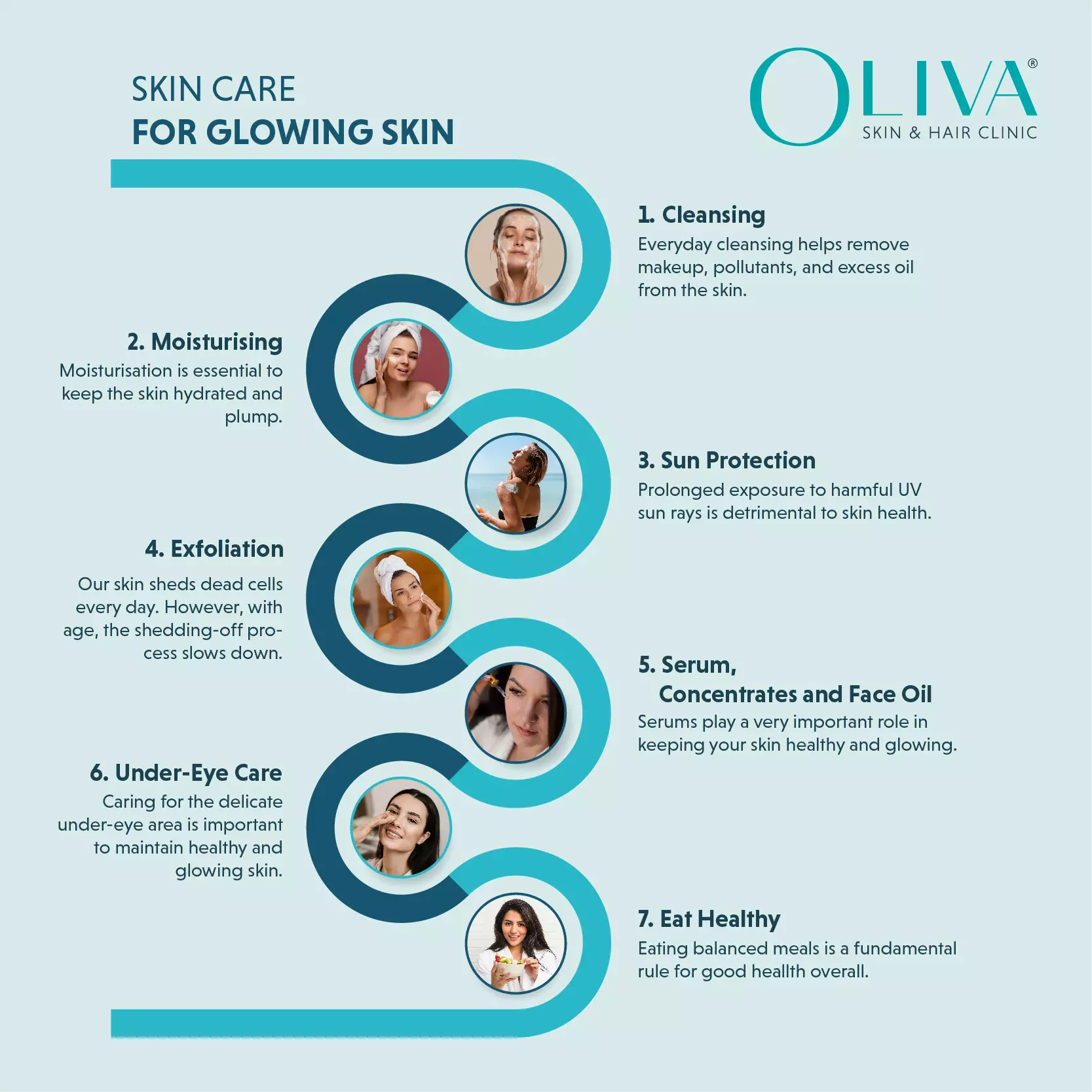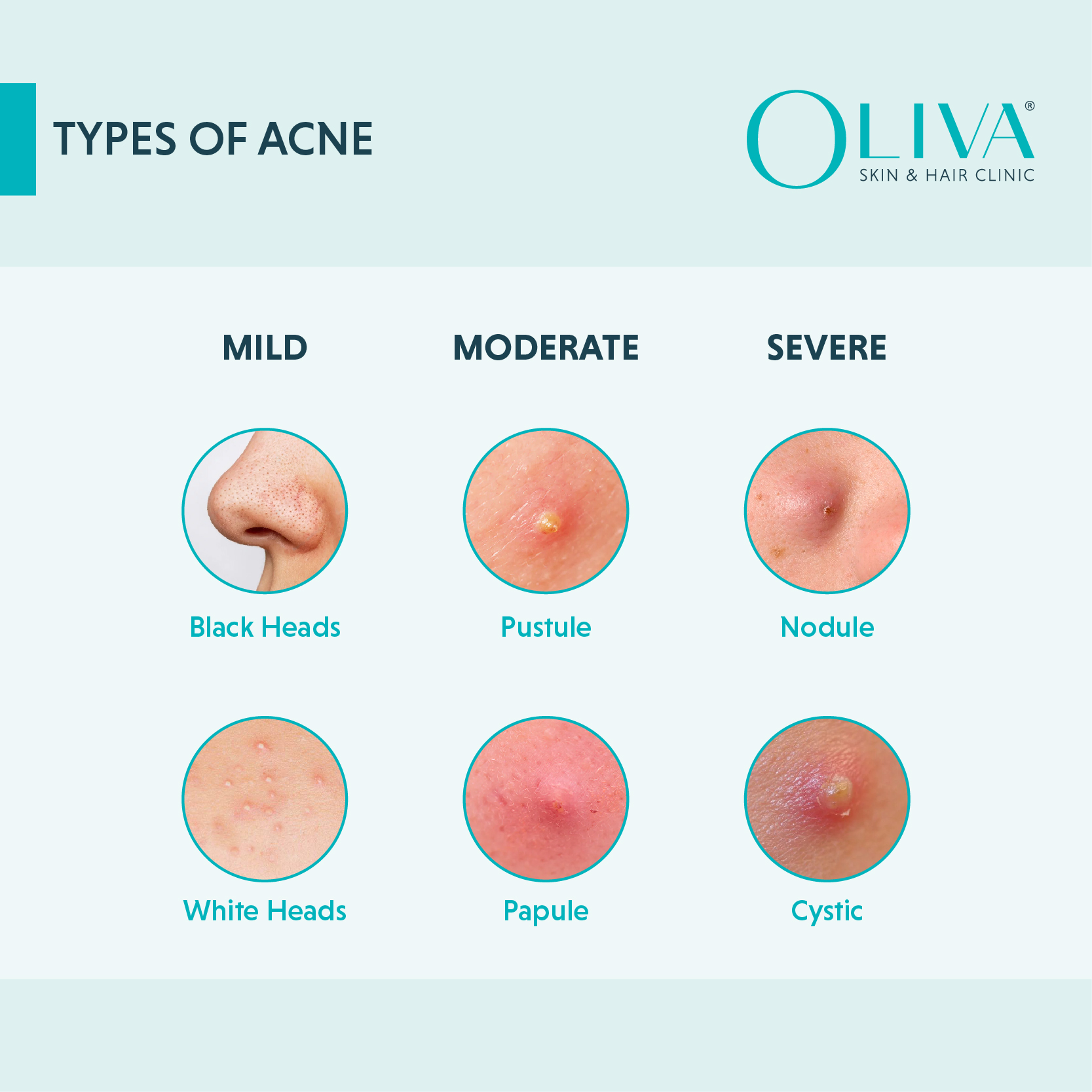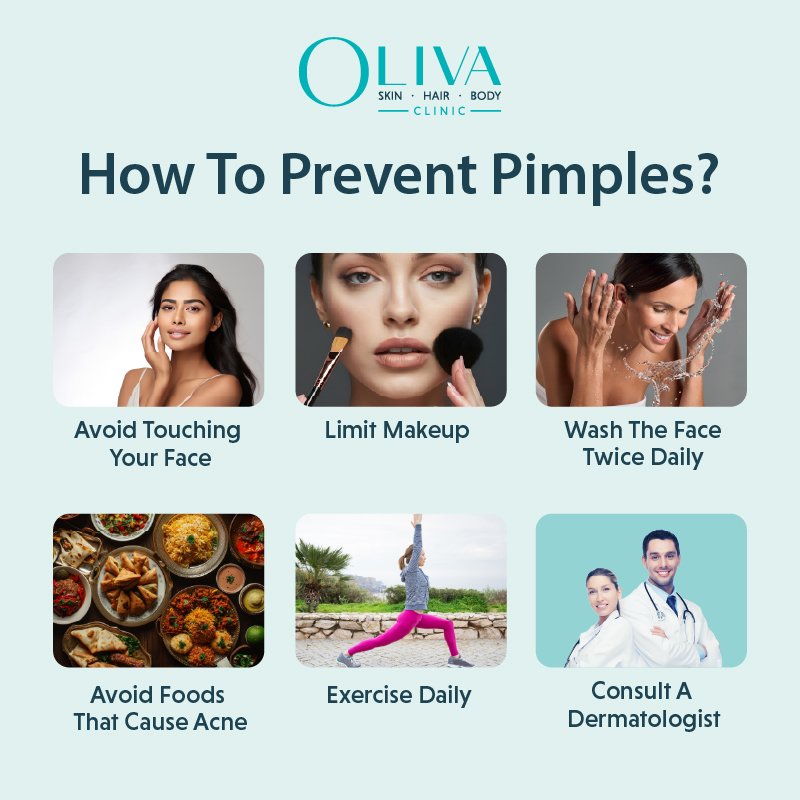Daily Skin Care Routine 7 Steps To Follow For Glowing Skin
Are you keen to learn more about daily skin care routine for glowing skin? Do you aspire to have a radiance that makes others wonder what skincare products for glowing skin you are using? Keep reading to benefit from skincare tips for glowing skin. Even though skin covers our body completely, it is a sensitive organ. We all have different skin types and, hence, the skincare routines also vary accordingly. Some may see glowing skin as a sign of good health, while others may want that radiant look to enhance their appearance. Whatever your reason, what is common to all is the need for consistent skincare to achieve healthy and glowing skin. Here, the guidance you seek from expert dermatologists and the use of the best skincare products for glowing skin can make all the difference. This article talks about the importance of glowing skin and the factors that affect it in detail. Learn why knowing your skin type makes all the difference and the ideal daily skin care routine for glowing skin that can work wonders for you!
Table Of Content

What Is Glowing Skin?
Glowing skin means good, healthy-looking skin. However, the term itself can have different connotations for different people. It is not necessary that glowing skin is perfect. Your skin could be radiant, smooth, soft, and hydrated yet have open pores, freckles, tan, wrinkles, and blemishes.
Hence, if you truly want your skin to glow with good health, it is important to follow a healthy lifestyle and a daily skin care routine for glowing skin.
Factors That Influence Skin Health:
There are many factors that affect our skin health. Every person has a different skin type. Many have a natural glow, while others don’t. Let us check out the factors that influence skin health:
-
Hormones:
Hormones are one of the main factors that influence skin health. Hormonal changes can trigger acne breakouts[1], leading to inflamed, rough, pigmented and oily skin. This type of change generally affects women having hormonal changes due to menstruation, pregnancy, PCOS and menopause and teenagers undergoing puberty.
-
Genes:
Often, if you have chronic skin conditions like eczema[2], atopic dermatitis or acne, the reason is genetic[3]. These conditions increase the risk of uneven skin tone and texture.
-
Lifestyle:
Your lifestyle habits directly affect your skin tone and health. The amount of water you consume, your diet, stress levels, sleep cycles, and the type of skincare products you regularly use all impact your skin health. This is why a few lifestyle changes are a must along with a glowing skincare routine to improve your skin health, covering all aspects of your life.
-
Medications And Health Concerns:
Skin concerns are often symptomatic of underlying health conditions or hormonal disturbances. Certain medications, too, may cause acne or pigmentation as a side effect that may adversely affect your skin glow and appearance[4].
-
Environmental Conditions:
In many cases, prolonged exposure to UV rays, toxic pollutants, and harsh environmental conditions can harm your skin, leaving it dull and damaged. However, you can always consult a dermatologist to learn effective skincare tips for glowing skin.
Skincare For Glowing Skin:
When looking for a daily skin care routine for glowing skin, it is important to understand that good skin health may not necessarily come from using expensive products or by following complicated skincare steps. The key lies in finding simple ingredients and products that work for your skin while following a dedicated, easily doable routine after understanding your skin type.
For example, a simple night care routine for glowing skin would suit all individuals who are busy the whole day. Similarly, an easy and simple-to-follow glowing skincare routine that benefits many just involves cleansing, moisturising and sun protection. Read along to understand the essential skincare steps.
Expert Tip
Remember, knowing your skin type is essential even before you start your skincare routine. Understanding your skin type can help you achieve your desired results by choosing suitable products.
Why Should You Know Your Skin Type Before Starting A Skin Care Routine?
Every skin type is unique and requires customised care. There is no one-size-fits-all approach to skincare. Using harmful skincare products that do not suit your skin type can damage your skin and leave it looking dull.
Uneven skin tone, breakouts, fine lines, redness, pigmentation, and inflammation are some side effects of using harsh products on sensitive skin types. Similarly, using non-hydrating products on a dry skin type can lead to dullness, premature ageing, and roughness of the skin.
Clearly, understanding your skin type can help you choose the best skincare products for glowing skin.
What Is My Skin Type?
Learn about the unique characteristics of each skin type to identify which one is yours:
-
Oily Skin Type:
Oily skin typically looks greasy and shiny and feels damp. This skin type generally displays an overproduction of sebum due to extreme weather conditions, hormonal changes, or genetics.
-
Dry Skin Type:
Dry skin lacks hydration. It is tight and rough, and feels stretchy all the time. You may have dry and scaly skin due to genetic factors that may become rough and scaly because of deficiencies, cold climate, and ageing.
-
Sensitive Skin Type:
Sensitive skin is easily prone to inflammation, redness, blemishes, itching, and rashes. People have sensitive skin by birth that may aggravate due to overexposure to sunlight, extreme weather, harsh chemicals, allergens, and strong medication.
-
Combination Skin Type:
This type of skin is a mix of dry and oily. Some parts of the face appear dry, and others oily, especially the T-zone (forehead, nose, and chin). Genetic factors, weather conditions like humidity, and changes in hormones may aggravate this skin type.
-
Normal Skin Type:
Normal skin is neither too oily nor too dry. It has a normal pH balance. A good lifestyle, eating habits and regular skincare can help maintain this skin type.
Are you wondering what your skin type is? Find out how to analyse your skin type, or simply consult a dermatologist for appropriate skincare tips for glowing skin.
How To Analyse Your Skin Type:
Given below is an easy method to analyse your skin type at home:
Step 1:
Thoroughly wash your face with water using a gentle cleanser.
Step 2:
Wait for an hour or so without using any products on your skin. During this time, avoid touching your face.
Step 3:
After an hour, observe your face closely for the characteristics it displays compared to the ones mentioned below and determine your skin type.
- If your skin appears greasy and shiny even without applying any product, you have an oily skin type.
- If you observe rough, stretchy, and flaky skin that feels tight, you have dry skin.
- If you find out your skin is neither dry nor oily, you have a normal skin type.
- If you notice your skin is dry in the cheek areas and oily on the chin, nose, and forehead, you have a combination skin type.
- If you observe your skin is getting red spots or rashes or feeling irritated, you may have a sensitive skin type.
A Simple Skincare Routine For Glowing Skin:
A glowing skin is usually smooth in texture. It reflects light easily and hence appears radiant and flawless. To keep your skin healthy and glowing, it is important to understand what is good for your skin and which products to avoid. Staying away from products with parabens, dyes, and sulphates is always a good idea.
Here is a simple skincare routine for glowing skin:
Step 1: Cleansing —
Everyday cleansing helps remove makeup, pollutants, and excess oil from the skin. It is best to opt for a gentle cleanser that is pH-balanced. Avoid using soaps or products with strong chemicals. Always make sure to cleanse your face in the morning, before bed, and every time there is an activity involving sweating. Never sleep with your makeup on, as it can lead to blocked pores, inflammation and breakouts.
Using warm water for cleansing is a good idea. Avoid scrubbing your face dry after cleansing; gentle pat drying with a soft cotton clean towel works.
Step 2: Moisturising —
Moisturisation is essential to keep the skin hydrated and plump. It is best to apply a moisturiser after cleansing, as it helps to retain moisture. If you have oily skin, choose an oil-free option with hyaluronic acid. If your skin is dry, go for a richer formula with aloe vera or shea butter. You can also select from a range of moisturising gels, creams, and lotions based on your skin type. While daytime requires a light moisturiser with SPF and tints, nighttime skincare demands a heavy hydration-locking application that facilitates repair and regeneration.
Step 3: Sun Protection —
Prolonged exposure to harmful UV sun rays is detrimental to skin health. It can damage your skin, causing redness, pigmentation, premature ageing and dullness. Applying sunscreen is a simple yet effective way to protect your skin health. Choose a broad-spectrum sunscreen with SPF 30 or higher that suits your skin type. Apply it to all sun-exposed body areas, including your face and neck. Wear full sleeves, hats, sunglasses and a scarf and use an umbrella while stepping outdoors. Include sunscreen as a must-have in your daily skin care routine for glowing skin.
Step 4: Exfoliation —
Our skin sheds dead cells every day. However, with age, the shedding-off process slows down. As a result, dead cells accumulate on the top layer of the skin, making it look dull and tired. Hence, exfoliation is a must to rejuvenate the skin using a mild facial scrub. You can choose from chemical exfoliants, physical ones, or enzyme-based scrubs. You may exfoliate your skin with a gentle scrub once a week for the best results. Scrubs not only leave your skin feeling smoother but open clogged pores.
Step 5: Serum, Concentrates and Face Oil —
Serums play a very important role in keeping your skin healthy and glowing. They contain active ingredients like retinol and Vitamin C which help your skin get rid of tan, dark spots, acne and patchy complexion. You can buy serums addressing specific skin concerns such as pigmentation and anti-ageing serums or add it to your regular skincare routine for glowing skin. This versatile skincare product makes for a great makeup base as well as an overnight nourishing application.
Step 6: Under-Eye Care —
Caring for the delicate under-eye area is important to maintain healthy and glowing skin. Dark circles, crow’s feet, under-eye bags and tear troughs are signs of deficiencies, premature ageing, lack of sleep and improper good skincare. Ensure you have ample sleep and nutrition and follow night skincare routines for glowing skin.
Step 7: Eat Healthy —
Eating balanced meals is a fundamental rule for good heallth overall. Vitamins like C, A, K, E, omega 3, etc., are beneficial for healthy and glowing skin. In addition, having a fibre-rich diet supports gut health that eventually reflects on your skin.
Lifestyle Changes For Glowing Skin:
If you want to see an improvement in your skin health and get that radiance, then there is nothing better than a positive and healthy lifestyle.
Here are a few lifestyle changes you can make to achieve glowing skin:
- Drink plenty of water, at least 2 litres a day, to flush out body toxins and keep your skin hydrated and plump.
- Get a good night’s sleep of at least 8 hours for a relaxed, stress-free appearance. Fix your sleep and wake-up timings.
- Consume a healthy, balanced diet rich in antioxidants, vitamins, nutrients and minerals.
- Stay away from cigarettes and alcohol, as these may lead to hyperpigmentation, premature ageing and other skin-related concerns.
- It would help to incorporate regular exercise into your routine to get your metabolism going.
- Get periodic dermatological screenings to maintain your skin health. Expert advice and regular checkups help detect skin cancers in a timely manner and aid in managing skin disorders like eczema, psoriasis, acne, and dermatitis.
When To Visit A Dermatologist?
As mentioned above, it is always a good idea to visit a dermatologist for periodic screenings of your skin and hair health. In addition, when your skin starts getting pigmented or you notice significant changes in its texture and tone, it is best to seek advice from a dermatologist. This helps you get professional guidance on suitable skincare routines, products, and treatments that are specific to your skin type and needs.
For those who are unable to select the best skincare products for glowing skin or decide which tips to follow, professional advice from a dermatologist significantly helps improve their skin health.







